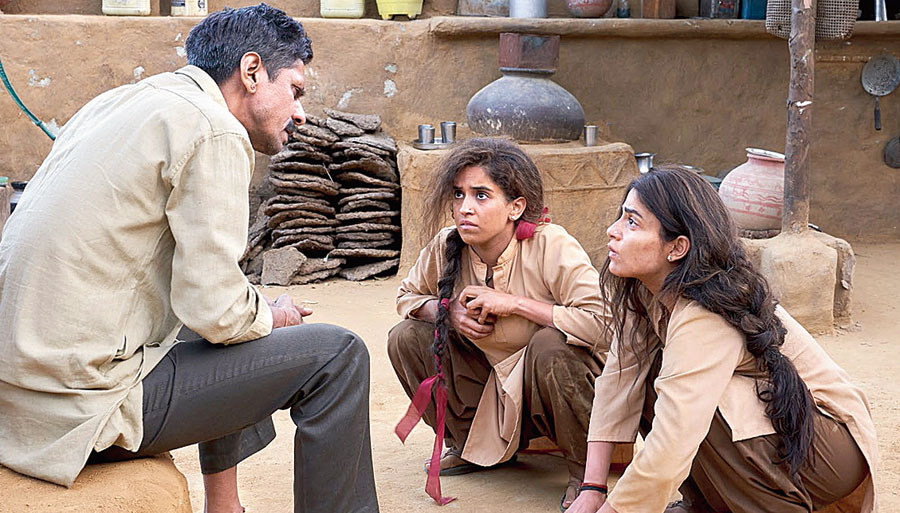Vishal Bhardwaj’s Pataakha is Karan Johar and Sooraj Barjatya’s worst nightmare come true. It’s not all about loving your family. Based on Rajasthani writer Charan Singh Pathik’s short story Do Behnein, Pataakha is about two warring sisters, Champa Kumari aka Badki (Radhika Madan) and Genda Kumari aka Chutki (Sanya Malhotra).
It’s established within the first 15 minutes that these two are analogies for India and Pakistan. Then there’s their hapless loving father, Bapu, (the forever perfect Vijay Raaz) who can do anything for his daughters, and a good-for-nothing family friend Dipper (Sunil Grover) who instigates the fights and has fun at the sisters’ expense.
The story is set in a village somewhere in Rajasthan and there’s a distinct dialect that acts as a double-edged sword — it shows authenticity but also makes it difficult for the average viewer to follow the language at times. With matted hair, stained teeth, uneven skin and dusty clothes, Malhotra and Madan bite into the skin of their characters with perfection. They have one thing in common. Both have dreams — Badki wants to have her own dairy farm and Chutki wants to build her own school.
The two fall in love, elope and get married to their lovers who turn out to be brothers (Namit Das and Abhishek Duhan). That’s where the interval happens, also exactly where the trailer of the movie ends. The audience is basically left clueless and the possibilities are endless. It’s a refreshing change because these days the entire movie gets shown in the trailer itself.
Bhardwaj’s touch is evident through the film. Be it naming Grover’s character Dipper because of a childhood eye defect that makes his eyes droop frequently to rusty songs like Balma to featuring a lot of cows in the film (Matru Ki Bijlee Ka Mandola, anyone?). The title track is groovy —just like the film — and you’ll end up humming that one line long after the movie ends.
Talking about cows, there’s this one scene where Chutki encounters cows in every single lane she takes (she hates cows because of her sister’s love for the bovine creatures). It’s not too far-fetched to think that Bhardwaj’s trying to draw parallels with the current scenario in the country, and it’s probably only him who can pull off a political satire with the front of a quirky comedy. For example, he compares the wise old Daadi of the two brothers with America — one who’ll never let batwara of the two brothers happen while she’s alive — “Jab tak America hai tab tak kuch nahi tootega”. There’s an element of cricket too (because India-Pakistan, after all), so when the two sisters try to do the batwara while Daadi is away for two days, Dipper says, “Ab powerplay shuru karo!”
Badki and Chutki are both strong female characters and they shine — right from changing their body language, mannerisms and clothes, which shows a time leap from their schooldays to when they become middle-aged mothers.
Bhardwaj’s writing is evident in dialogues where Badki compares the magnitude of her love for her lover to “Jitne bail hain duniya mein, jitne doodh hai duniya mein” with unfaltering innocence.
Madan makes a confident debut and Malhotra spits fire with each dialogue. But it’s Grover who steals the show and has some of the best lines in the film. He’s always selling things — be it cucumber, movie tickets in black, magic potions that make you younger or grow hair in your bald head. “Laila ki haddi, Majnu ki pasli, meri kakdi asli,” he says while selling cucumbers, in his signature style.
There are some other oddball characters, too, like Chutki’s husband (Duhan) who has this need to show off his English-speaking skills. In a tense moment, when Chutki is being married off to a rich widowed man of the village, Duhan still sticks to, “Darling, let’s run away”, to which Dipper goes, “Oh, Trump ke tau”. It’s moments like this that makes Pataakha worth a watch. The second half is a bit of a drag; the editing could’ve been snippier. But the first half, full of fire and innovative gaalis by the sister duo, makes up for it.
Bhardwaj ends the film with a voice-over, hoping that Israel-Palestine, North and South Korea and India-Pakistan will forgive and forget too, someday. Wishful thinking much? But that’s poetic license!











